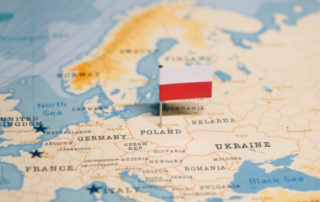
Europe is once again experiencing intense, active military conflict on its doorstep. Accordingly, many European countries, motivated by Russia’s ongoing violent campaign to seize Ukraine, are now forced to re-examine their defense plans, capabilities, and, importantly, defense budgets.
For some EU countries, this is the first time they have had to seriously consider military and defense spending in several years. However, it is not only military budgets that require reassessment but also perceived identities and roles that must be reckoned with as NATO and the EU attempt to unite behind a shared strategy.
With the United Kingdom’s withdrawal from the EU, Germany has become the top military spender. Last year, Germany was reported to have spent $55.8 billion on its military, with France just behind spending $53.6 billion. This is almost double what Italy and Spain, which have the third and fourth largest expenditures respectively, paid in 2022.
However, with support for funding the conflict in Ukraine globally waning, European countries may need to dig deeper in 2024 to support Kiyv’s war effort.
Germany’s expenditures are expected to increase again in 2024 with the adoption of a $51.8 billion defense budget and $19.2 billion in extra-budgetary funds intended to further the training of armed forces. Defense spending is the only aspect of the German budget that will not be facing cuts in 2024, partly due to Germany’s commitment to dedicating 2% of its total funding to military spending in compliance with NATO standards.
Immediately after Russia invaded Ukraine in early 2022, Olaf Scholz , Chancellor of Germany, delivered a speech to the German parliament calling the conflict a sign of a “Zeitenwende,” or changing times, and encouraging Germany to shed its longstanding reservations regarding its military presence in Europe, which date back to World War II. In the same speech, Scholz clarified that Germany would take an irrefutable stance against Russian aggression, commit to its NATO obligations, and further support its allies to the east, with which Germany has particular sympathy, having once been the easternmost country of the NATO alliance.
Since Scholz gave this speech, Germany has fulfilled these goals, and in addition to announcing 2.7 billion euros in aid to Ukraine during a meeting in Washington, DC with US Secretary of Defense Lloyd J. Austin III, German defense minister Boris Pistorius confirmed in June 2023 that Germany would permanently station 4,000 troops in Lithuania, which borders the Russian enclave of Kaliningrad; following up on a German pledge made in June 2022 to send combat troops to the country.
Germany has also ramped up its presence in Estonia and Latvia by agreeing in May of 2023 to supply the two countries with IRIS-T SLM defense systems manufactured by the German company Diehl. The medium-range defense systems feature truck-mounted missile launchers currently used in Ukraine. They can neutralize aircraft, helicopters, uncrewed vehicles, and more.
Germany has also openly expressed interest in boosting its presence in the Indo-Pacific as a potential strategic move against an alliance between China and Russia. Evidently, Germany is shaking off its last reservations about having a robust military and economic presence on the world stage and is embracing its new role in defense leadership.
However, defense spending is proving to be more contentious across the EU than expected. Although most members of the EU, NATO, and their allies seem to agree that increased spending and more active military is desirable, the two largest economies in the EU, Germany and France, disagree on how to do those things.
The EU's second-largest economy, military spender, and largest arms exporter, France, has voiced discontent with certain new German defense strategies.
Germany announced in October of 2022 that it was spearheading the European Sky Shield Initiative along with 14 other NATO members and allies, including Finland and the UK. The plan allows for the joint purchase and use of “off the shelf” air defense systems- like the US Patriot, the Israeli Arrow 3, and the German IRS-T systems. However, France, Italy, and Poland notably did not sign the initiative. France postponed a summit with Germany to signal its ire. France has also criticized the German plan for being too invested in defense and not proactive enough offensively.
France has protested the initiative heavily, and France may interpret Germany’s new strategies, which notably do not feature French defense systems, as a snub to France’s position as a powerful exporter of arms.
France’s main critique of the German plan is that it relies too heavily on foreign powers, like the US, to provide defense systems in Europe instead of depending upon European countries to provide the necessary defense systems. France has rallied support from Belgium, Hungary, Estonia, and Cyprus, with additional support from Italy, to purchase the French Mistral defense systems to demonstrate the viability of an exclusively European air defense solution. France has also supplied Ukraine with Franco-Italian manufactured MAMBA systems as an alternative to German defense systems.
In response to France’s misgivings over its defense plan, Germany has insisted that the program allows France’s defense systems, like the MAMBA and SAMP systems, to be incorporated with the US, German, and Israeli systems as soon as enough are available. Boris Pistorius has emphasized that Germany’s plan is not intended to provoke competition with France but to prioritize creating a unified, pragmatic, and quick defense plan.
France and Germany are historical adversaries, and in the post-WWII world, Paris and Berlin have oftentimes clashed on defining a Europe-wide policy towards economic and foreign policy.
As the first major foreign policy challenge that poses a potentially existential threat to Europe, Franco-German disagreements against the backdrop of Russian agression pose a similar intra-European challenge to the contintent’s cohesion. The implications of the tension between France and Germany regarding security in the EU may not be immediately apparent to outside observers, but they are certainly cause for concern.
During a crisis, the animosity between the two most powerful countries in the EU spells trouble for an organization that hinges upon consensus and cooperation when responding to issues. Indeed, a disjointed defense system could lead to a disorganized response across the EU should violence spread.
As the conflict in Ukraine has demonstrated, defense systems and technology from different manufacturers and countries do not always work together effectively. Having two separate plans and strategies in Europe could ultimately have a similar outcome if the EU should need to protect itself down the line. Furthermore, smaller countries in the EU that rely on military assistance from larger countries could feel politically vulnerable when requesting aid. Two distinct defense plans may begin to feel like a referendum on power within the EU and the role of NATO in Europe.
US businesses looking to land European defense contracts will likely find opportunities in technology and manufacturing as most European countries go ahead with Germany’s Sky Shield Initiative, which prefers American defense systems. In fact, Germany’s leadership has now opened the market for more US defense systems in Europe.
However, US businesses should be aware of France’s unwillingness to participate in the initiative. In fact, France’s insistence upon European-manufactured systems could be problematic for further opportunities for security contractors. France’s reluctance to embrace US systems may eventually encourage other countries to do the same, limiting opportunities for US business in the future.



